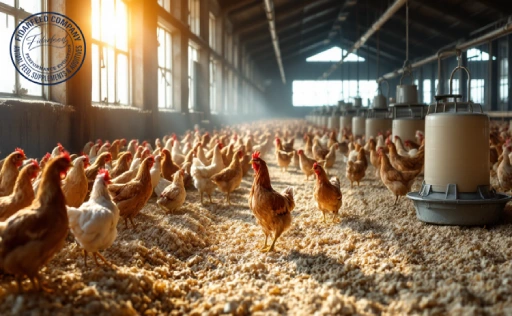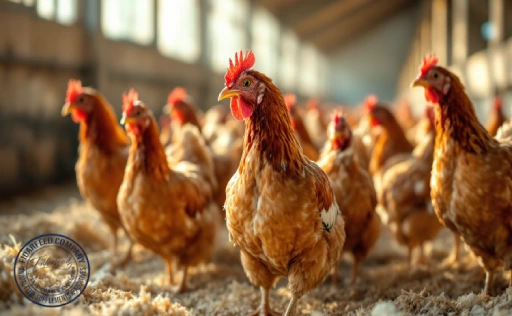
Probiotic online buyer’s guide — that’s a phrase you’ll hear more and more if you’re involved in the animal feed industry. Whether you’re raising chickens on a small farm or managing a large dairy operation, you’ve likely thought about using animal feed supplements to support animal health. But buying probiotics online can feel confusing — too many choices, too much technical language, and not enough clear advice.
That’s exactly why this guide exists. We’ll walk through everything you need to know before making your next probiotic purchase — from choosing the right type, reading labels, and avoiding scams, to ensuring the supplements actually deliver results. Let’s get started!
Why Probiotics Matter in Animal Feed Supplements
In today’s animal farming, probiotics are more than just a trend — they’re a tool for better results. These “good bacteria” help balance gut microbes, improve digestion, boost immunity, and reduce the need for antibiotics. This is especially important now, as many countries are moving away from routine antibiotic use in feed.
For example, Lactobacillus strains in poultry feed have been shown to increase egg production and reduce disease. In cattle, probiotic supplements support better digestion and milk quality. Even in aquaculture, probiotics help reduce disease outbreaks.
Learn more about: Alternative Feed Ingredient
The bottom line? Probiotics in animal feed supplements make a big difference — not just in animal health, but in your farm’s overall performance.
Understanding Probiotic Types in Animal Feed: A Buyer’s Guide for Breeders
Not all probiotics are the same. Some are better suited for specific animals, while others are designed to survive harsh feed processing conditions. Here’s a quick breakdown:
-
Lactobacillus: Ideal for poultry, pigs, and young animals.
-
Bacillus: Heat-resistant, perfect for pelleted feeds.
Learn more about: Livestock Feed Suppliers: Your Source for Premium Animal Nutrition
-
Enterococcus: Supports gut balance in a wide range of species.
-
Yeasts (e.g., Saccharomyces): Often used in calves and piglets to prevent diarrhea.
Before you buy, consider which probiotic strain best fits your animals and their current needs.
How to Read Labels on Animal Feed Supplements: A Key Probiotic Online Buyer’s Guide Step
Labels tell you a lot — if you know how to read them. Here’s what matters most when shopping for animal feed supplements online:
-
CFU count (colony forming units): This number tells you how many live microbes are in each dose. Look for high counts like 1 billion CFU/g or more.
-
Strain details: Quality products name their strains (e.g., Lactobacillus acidophilus LA-5), not just the species.
Learn more about: Why Choose Prepared Feed for Your Farm Animals: Livestock, Poultry, and Aquaculture
-
Shelf life and storage: Some probiotics lose strength quickly unless stored properly.
-
Inactive ingredients: Watch for unnecessary fillers or potential allergens.
If a product hides these details, it’s best to look elsewhere.
Top Factors to Consider Before Buying Probiotics for Animal Feed Online
Before placing your order, think about these important questions:
-
What type of animals are you feeding?
-
Are you raising them for meat, milk, eggs, or breeding?
Learn more about: Bulk Discounts on Prepared Animal Feed: Special Sale for Farmers
-
Do they have specific health issues or stress factors?
-
What form of feed are you using — pellets, mash, or liquid?
For instance, if you’re feeding broiler chickens in a humid climate, a heat-stable Bacillus probiotic might be best. Always align your purchase with your goals and local conditions.
Avoiding Common Mistakes When Shopping for Probiotic Animal Feed Supplements Online
Even experienced farmers sometimes get caught by marketing tricks. Here are common errors to avoid:
-
Going for the cheapest option — low price often means low quality.
-
Not checking the strain or CFU — an unknown strain may not be effective.
-
Ignoring product reviews or seller history — always check feedback and customer service reputation.
Learn more about: Top 10 Benefits of Bulk Animal Feed for Wholesalers
-
Skipping storage instructions — probiotics can die in heat or moisture.
Spending a little extra time reviewing these can save you money and headaches later.
Trusted Online Sources to Buy Effective Probiotic Animal Feed Supplements
Where you buy matters just as much as what you buy. Stick with websites or sellers that specialize in animal nutrition. Signs of a reliable source include:
-
Clear product descriptions and ingredient lists
-
Lab or field-tested claims
-
Customer support by animal nutritionists or veterinarians
Learn more about: Everything You Need to Know About Wholesale Feed Additives
-
Regulatory approval or certifications
Probiotic Buyer’s Guide Tip: Balancing Budget vs. Quality in Animal Feed Supplements
Not all high-quality supplements are expensive, and not all cheap ones are bad — but you do get what you pay for. Look at:
-
Cost per dose, not just per kilo
-
Strain effectiveness — has it been studied?
Learn more about: Why Ready-Made Feed is the Ideal Choice for Modern Farmers
-
Packaging — good packaging helps keep probiotics alive longer
For example, a more expensive probiotic that improves feed conversion by 3% may save you far more than it costs.
Customer Reviews and Ratings: What They Reveal About Probiotics
Customer feedback can help — but only if you read it wisely. Here’s how:
-
Look for specific benefits mentioned (like “better weight gain” or “less diarrhea”).
-
Check if the reviewer has similar animals or production goals.
Learn more about: Your Essential Checklist When Selecting Bulk Animal Feed Suppliers
-
Be cautious with products that have only 5-star ratings with no details.
A detailed 4-star review from a farm similar to yours can be more helpful than a perfect score with no explanation.
Storing and Handling Animal Feed Probiotics the Right Way
Even the best probiotic supplement won’t work if it’s dead by the time it reaches the animals. Here’s how to store it:
-
Cool and dry — ideally in a refrigerator, unless it’s shelf-stable.
-
Tightly sealed — reseal after every use to prevent moisture exposure.
Learn more about: biotechnology in animal feeds and animal feeding
-
Use by the expiry date — even if it looks fine, potency drops over time.
Store smart, and your animals will get the full benefit.
Final Checklist: Your Go-To Probiotic Online Buyer’s Guide for Animal Feed Supplements
Before you hit “Buy Now”, review this checklist:
- Choose probiotics based on your animals’ species and life stage
- Check CFU count and strain details
- Buy from specialized, trusted sources
- Compare true cost per dose, not just the bag price
- Read reviews critically, not emotionally
- Store and handle with care
Conclusion
Smart shopping for probiotics isn’t just about price or brand — it’s about making choices that truly support your animals’ health. With this probiotic online buyer’s guide, you’re now equipped to choose animal feed supplements that deliver real value and visible results.
Have tips or questions to share? Drop a comment below! Let’s grow together and help each other make better decisions for animal health and farm success.







